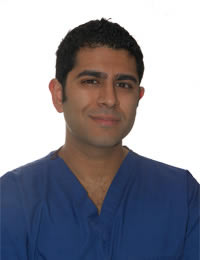What Does It Take To Become A Dentist?

A brief look at the lengthy training process undertaken by our Chelmsford dental team.
As a part of the medical profession, dental care is important, not only to enable a functional mouth but also as a part of preventative health care. Although a few patients might think that it can’t be too difficult to drill a hole in a tooth and fill it or to pull a tooth out, the reality is much different and a lot more involved. People often don’t realise that a tooth is not a single block of material but is much more complex than that. There is also gum health, supportive bone structure and surrounding nerves in the area of a tooth to be considered in even a straightforward procedure.
To train to become a dentist requires a lengthy period of five years of studying and practical training before you can perform procedures unsupervised and be employed as a professional dentist.
Five years may seem a long time to study for this but there are many areas that need to be thoroughly covered. Naturally, we can’t cover everything involved as this would take, well, five years! We thought, however, that patients of Blue Sky Dental might find it interesting to get an overview of some of the key areas of training that are covered during this period.
Initial qualifications
Before actual dental training can commence, a candidate will need to have A level qualifications, very often at a high grade and in some cases, at least some of these may need to be in science subjects such as biology or chemistry. Some courses may offer a ‘pre dental course’ year of study for those that don’t hold these qualifications but may be acceptable in other ways.
University courses
The next step is to apply to one of the currently sixteen schools of dentistry in the UK. If successfully completed, this will lead to you obtaining a Bachelor of Dental Surgery (BDS or BChD) degree. You will then be required to undergo a year of supervised training before you can register with the GDC (General Dental Council).
What will you learn?
This can be broken down into a number of different areas, the most significant of which is the clinical side where you will learn not only about all aspects of the oral cavity but also areas such as the neck and jaw that can be affected by dental problems too. You will also study the general human body, potential diseases and how these relate to oral health.
You will also learn how to take x-rays and scans and to detect and treat all areas of dental problems, from a small filling to more complex procedures. You will also learn how to create a sterile environment to prevent cross contamination within the practice, including the cleaning of equipment and will also learn how to read and examine scientific papers so that you can keep up to date with developments throughout your career.
Professional care
In addition to the medical aspect of dentistry, you will also learn the legal and ethical side of the profession. You will learn how to work with other members of a dental team and how to minimise the number of mistakes that can be made and how to learn from any that do occur. You will also learn about patient safety and the standards that are required from you as a professional member of the medical profession. Safeguarding of patients, both children and adults will also be covered.
Communication skills
If you are not afraid of a visit to the dentist, you will almost certainly know someone who is. This can be a daunting experience for nervous dental patients and it is important that dentists communicate in a calm and friendly manner so that patients feel comfortable in receiving ongoing dental care. During your course you will learn communication skills in order to be able to gain consent from patients with varying levels of understanding of the treatment they are about to undergo. At some point in your career, you may well also receive complaints about your practice and this area will be addressed too.
Once you have successfully completed your course, and undergone the required supervised training, you will be ready to register with the GDC and practise alone.
Additional training for dental implant placement
In addition to the five year course required to qualify as a dentist in the UK, some areas like dental implant placement require further training of up to two years. This is in addition to the general dental training mentioned above.
As you can see, if you visit a dentist in the UK, they won’t just have learned it ‘on the job’ but will be highly knowledgeable both in the diagnosis and treatment of any dental problems that you might have. We hope that this helps to reassure our Chelmsford patients, whether nervous or not, that they are in safe and experienced hands when they attend our dental practice for a check up or for treatment.
If you would like to book an appointment with one of our dentists, please call Blue Sky Dental on 01245 211070.

Leave a Reply
You must be logged in to post a comment.